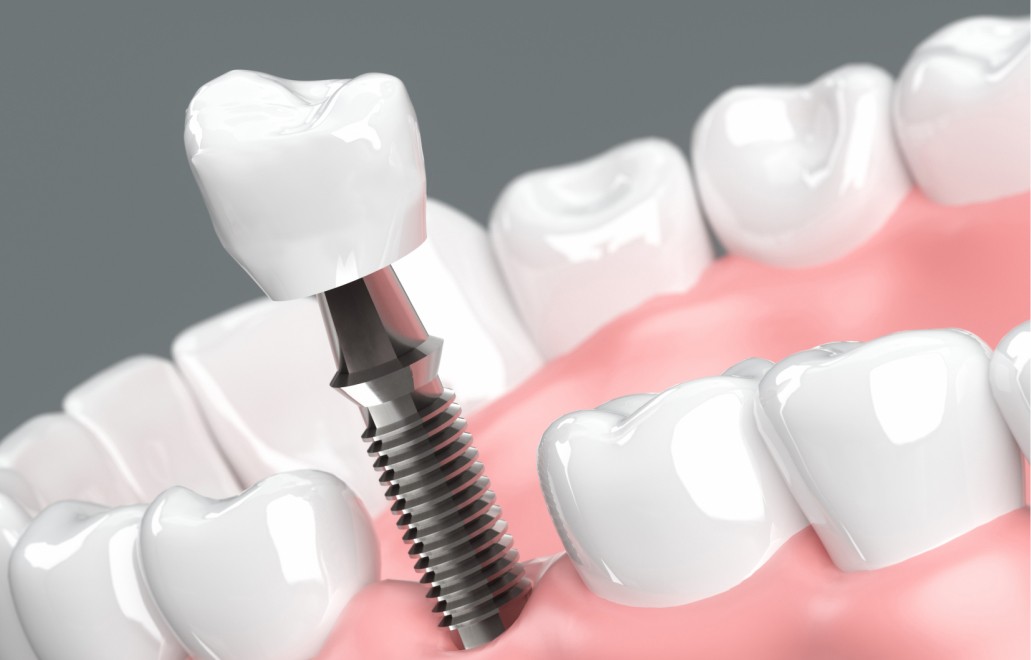Dental Implant

Contents
What is dental implant treatment?
Implant treatment is a type of dental treatment and refers to artificial teeth that are implanted into the jawbone to replace missing teeth. In this treatment, an artificial tooth is anchored to the root of the tooth, allowing for a natural bite and appearance.
Implant treatment usually takes several months to a year or more. After surgery, time is needed for the implant to fuse with the bone, and several visits to the dentist are required during this time.
Features of Dental Implants

Some of the features of implants are:
Natural appearance and chewing comfort: Implants provide a look and feel similar to your own teeth. There is less discomfort with surrounding teeth, and a natural oral environment can be restored.
Less impact on healthy teeth: Implants can distribute the force of the bite stressing other teeth. There is no need to grind the surrounding teeth.
Prevents bone loss: Implants prevent bone loss by allowing the artificial tooth root to fuse with the jawbone. It also helps maintain the quantity and quality of bone in the jaw.
These are the basic features of implants. It is important to consult with a dentist to develop an optimal treatment plan according to the oral condition and individual needs.
The basic flow of an dental implant treatment
The following is the basic sequence of implant treatment:
Consultation and Diagnosis: First, a consultation takes place at the dentist’s office to obtain detailed information about the patient’s own teeth and treatment. Then the necessary examinations and diagnoses are made.
Formulation of the treatment plan: After consultation with the dentist, a treatment plan is formulated according to your individual condition and needs.
Surgery: The surgery is performed under general anesthesia. A hole is drilled in the jawbone and an artificial tooth root is implanted.
Fabrication and placement of the superstructure: After the artificial tooth root has sufficiently adhered to the tissue, the artificial tooth is fabricated and placed.
Follow-up: After treatment, regular maintenance and checkups are performed to monitor the condition and progress of the implants.
These are the basic features of implants. It is important to consult with your dentist to determine the best treatment plan based on your oral health and individual needs.
Pros and Cons of Dental Implant Treatment
Implants have the following advantages and disadvantages.
Advantages of dental implant treatment

Can chew like natural teeth
Implant is a treatment method that artificially reproduces the root of a tooth. Therefore, you can enjoy eating as if they were your own teeth. Compared to dentures or bridges, implants give you a stronger bite, so you can chew hard foods more firmly.
Beautiful appearance
Implants can be selected to match the color and shape of the patient’s teeth, allowing the patient to maintain a natural-looking smile without others noticing the implants.
Minimal impact on healthy teeth
While bridge treatment requires the removal of other healthy teeth, implant treatment can replace missing teeth without affecting other teeth. By preserving the surrounding healthy teeth, oral health can be maintained.
Bone loss can be prevented
When teeth are missing, the jaw bone gradually loses weight. Implants, however, are firmly attached to the jawbone, preventing bone loss. The jawbone can be preserved and the shape of the face can be maintained.
No pressure on other healthy teeth
Because implants are freestanding, they do not place pressure on surrounding teeth. Other treatment methods may require the surrounding teeth to be ground down.
Disadvantages of dental implant treatment

High cost of treatment
The cost of implant treatment is higher than other treatment methods. It is self-funded and not covered by insurance. In addition, because the treatment period is longer than a single surgery, the cost of treatment may be spread over several procedures. However, from a long-term perspective, implant treatment is more durable than dentures or bridges, and ongoing maintenance is relatively easy, so there can be an overall cost benefit.
Surgery may be required
Implant treatment may require dental surgery. Surgery is performed to implant the artificial tooth root into the jawbone. The surgery is performed under local anesthesia and is rarely painful or uncomfortable. However, temporary swelling and pain may occur after surgery. These symptoms can be alleviated with appropriate procedures and medications, but proper treatment and aftercare during surgery is important. Even if surgery is necessary, the appropriate surgical procedure can be selected based on the individual’s situation. There are various methods, such as the one-time or two-time method, and the best method is selected after consultation with the dentist.
Comparison of dental implant treatment with other treatment methods
Implant treatment has several advantages over other treatment methods. In particular, it can be compared to dental bridges and denture treatment.
Dental Implants vs Dental Bridges

A dental bridge is a type of treatment in which the teeth on both sides of a missing tooth are shaved and the missing portion is replaced with an artificial tooth called a bridge. Implant treatment, on the other hand, involves implanting a titanium artificial tooth root into the root of the missing tooth and attaching an artificial tooth on top of it.
While bridges require the removal of surrounding teeth, implants can replace a missing tooth without stressing other teeth. Bridges also put pressure on surrounding teeth, which can shorten the life of those teeth. In contrast, implants allow you to bite as if they were your own teeth and do not put pressure on surrounding teeth, so they have less impact on healthy teeth compared to other treatment methods.
Dental Implants vs Dentures
Dentures are a treatment method in which artificial teeth are placed in the missing area. Implant therapy, on the other hand, involves implanting an artificial tooth root into the jawbone and attaching an artificial tooth to it. Dentures are easily dislodged, causing inconvenience when eating and speaking. Implants, on the other hand, are firmly fixed in place and will not come loose like dentures. In addition, because implants allow you to chew as if they were your own teeth, chewing stimulates brain cells and is said to improve cognitive function.

In addition, dentures require ongoing maintenance, including fabrication, adjustment, and cleaning. Implants, on the other hand, require regular maintenance after treatment is complete, but they are less invasive than dentures and can be cared for in the same way as your own teeth.
How long is the life span of Dental Implants?

Average life of implants
While the life of an implant can vary from patient to patient, the average life of an implant is 10 to 15 years. This is because implants are generally more durable and last the longest compared to other treatments.
Importance of self-care
Routine self-care is extremely important to prolong the life of the implants. Attention must be paid to oral hygiene to prevent bacterial infections that can shorten the life of the implants. In addition to brushing and flossing, it is important to use interdental brushes and mouthwash to keep every corner of the mouth clean.
It is also important to address any habits such as grinding or clenching. These habits can put undue stress on the implants and shorten their lifespan. Consider wearing a mouth guard or practicing relaxation techniques to help with these habits.
In addition to increased self-care awareness, regular visits to the dentist are essential. It is important to get professional advice on proper care and to have your oral health checked.
Characteristics of toothbrushes that should be used
Toothbrushes with soft bristles are suitable for use after implant treatment. If a toothbrush with hard bristles is used, it may damage the teeth and gums. Also, choose a toothbrush that is an appropriate size. If it is too large, it will be difficult to remove plaque and stains around the implants.
Importance of regular Dental Implant check-ups
After implant treatment, it is important to have regular implant check-ups. This chapter explains why and how often.
Purpose and Frequency of Check-ups: The purpose of an implant check-up is to check the condition of the implants. Regular check-ups allow us to determine the following
Condition of the implant connection: Ideally, the implant should be connected to the bone. Periodic exams can confirm the status of this bond.
Check for proper alignment: We also check that the implants are properly aligned. If they are not properly aligned, they may need to be realigned.
Oral condition: The gums around the implant and the surrounding teeth are also examined for any abnormalities. This can lead to early detection and prevention of periodontal disease and peri-implantitis.
The recommended frequency of implant checks is usually once every six months to one year. However, it may vary depending on the patient’s condition and the type of implant. The specific frequency should be determined in consultation with the dentist.
The Toranomon Hills Dental Medical Ryu Clinic offers free consultations for a variety of dental problems.
You can be sure that we will always make suggestions that are appropriate for your situation and that we will always work with you to determine the best treatment plan.
Please do not give up and consult with us first.




